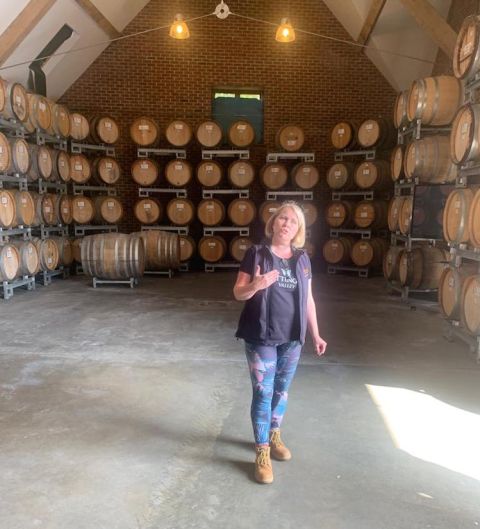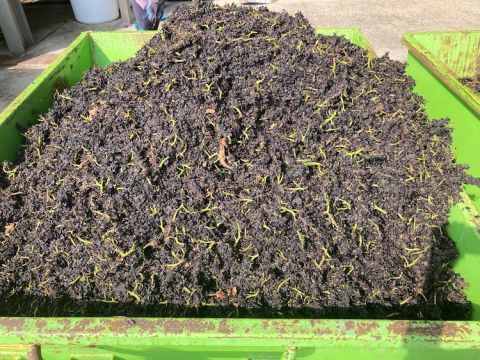England's steep learning curve

A version of this article is published by the Financial Times.
All over southern England, and even as far north as Yorkshire, the 2020 grape harvest is under way, rather earlier than usual with notably small bunches of good-quality grapes being the most common report. The UK is a bona fide wine producer nowadays with sales of 5.5 million bottles of English and Welsh wine last year, an extraordinary 70% more than in 2018.
Every year WineGB, the generic body representing producers, gives out awards for the best wines, and this year's were announced last month. The supreme champion was a 2014 sparkling wine from Hattingley Valley in Hampshire, run by 45-year-old Emma Rice.
She’s been in that position for 12 years and now, most years, makes between 300,000 and 500,000 bottles of sparkling and still wine, depending on the UK’s exceedingly variable weather. But when she was hired she had hardly any relevant experience. To be fair, not that many people did have much experience of making fine English wine in 2008. The Canadian couple responsible for Nyetimber’s excellent track record had only just arrived. Ian Kellett was still experimenting with champagne grapes at Hambledon south of Hattingley. The vines on Gusbourne Estate in Kent were only just beginning to bear fruit. Sussex neighbours Ridgeview and Bolney Estate counted as old-timers, but even their quality aspirations stretched back only as far as 1995, the year in which Peter Hall made his first sparkling wine at Breaky Bottom just south of Glyndebourne opera house.
Also in Sussex in 1995 the wine flame was lit for Rice. She had been working part-time for neighbour and family friend Barry Phillips at his particularly wine-focused White Horse at Chilgrove since she was a 15-year-old schoolgirl. It was a dinner to celebrate his 25 years there – attended, as it happens, by me, wine author Hugh Johnson and the late Michael Broadbent of Christie’s – that was the turning point. She had graduated from serving sandwiches in the pub to the restaurant section and her job that night included pouring the aperitif, a double magnum of Krug 1979. Phillips told her that if any was left, she could sample it. She made very sure that it was she who emptied the bottle, and she was blown away.
The result was that she did not pursue her HND (Higher National Diploma) studies in catering management, and instead went to work for the quirky wine retailer Oddbins, worked in a vineyard in New Zealand and was then taken on as personal assistant (the fate predicted for her by Barry Phillips) to the late Hilary Gibbs of Domaine Direct, a specialist UK burgundy importer. In 2000 she successfully applied to be managing editor of Hugh Johnson’s annual Pocket Wine Book for publishers Mitchell Beazley. Hugh remembers fondly her ‘ever-smiling face’ in their Canary Wharf offices and describes her today as ‘one of our First Division winemakers, and a great ambassador for the whole exciting business’.
While editing Johnson’s hugely popular book (12 million copies sold worldwide) she noticed that Plumpton College in Sussex was offering courses in winemaking and set off there in 2003. (A fellow student was another well-known maker of English wine, Dermot Sugrue, but he was wooed away to make wine at Nyetimber by its previous owner. He now makes his own Sugrue wines as well as those of Digby, Jenkyn Place and Wiston.) Undeterred by the fact that she had failed science at school, she graduated in 2006 with a BSc in Viticulture and Oenology. Her five fellow graduates now work, variously, in Australia, New Zealand and Canada as well as England.
Emma’s degree from Plumpton got her a job making wine at the respected Cuvaison winery in Napa Valley, which she loved, but really keen winemakers like to alternate hemispheres in order to cram two vintages into a year, so instead of staying in California she went to work on the 2008 vintage at Tamar Ridge in Tasmania. Soon after she came back she was introduced to the successful City lawyer Simon Robinson, who had decided to plant some vines near his home in Hampshire and to turn a nearby chicken farm into a winery.
He had asked the men who planted his vines if they knew anyone he might take on to help design the winery and make the wine. They had been at Plumpton with Emma and knew she was then at a loose end. She admits that, although at that stage Simon Robinson intended to focus, like all serious English wine producers at the time, on sparkling wine, she had very little relevant experience. But she also acknowledges what a rare opportunity she was given. Very few winemakers get to design their own wineries from scratch. Even fewer are involved in designing the labels.
The Hattingley Valley winery is one of the neatest and most spacious I have ever visited anywhere. Even the wood for a bonfire I saw in a corner of one of their two vineyards close to the winery had been arranged with painstaking care. Hattingley has so much winemaking capacity that it makes up to 30 other labels of wine apart from its own. On the sunny September day when I visited, Emma was off the next day to inspect four vineyards in Essex and Kent, some of them new to her. Only a tiny proportion of the many Brits who have decided recently that they want to plant vines are prepared to invest in building their own winery too. Presumably such a busy contract-winemaking operation was not the original intention for Hattingley, so I asked Emma how it had become so important. ‘Because Simon can’t say no’, she said with a broad smile.
Contract winemaking swelled to about 40% of Emma’s responsibilities until the giant harvest of 2018 came along and now the aim is to reduce it to 25%. She seems unfazed by a harvest workload that involves so many elements in a string of ridiculously long days. And her team, mainly male, looked happy and respectful to me. Because it was just before harvest, they were mainly tinkering with equipment – and she admits she’s no engineer herself. The bloated harvests of 2018 and 2019 required prompt delivery of new tanks, and the grape presses, used for a pitifully short time each year, need considerable tender loving care each September. High-acid grapes are a boon for sparkling wine, but as summers warm up, Emma, like so many other English-wine producers, is making increasing amounts of still wine. I’m a particular fan of Still by Hattingley Rosé, based on the Pinot Noir that is so widely planted in the UK because it’s a champagne grape.
In 2012, on the other hand, the summer was so miserable that the grapes simply wouldn’t ripen. Unfortunately, this was the first year that Hattingley took on their viticultural consultant, who commutes from Champagne. Winery employees are considered essential workers, I was delighted to learn, and so escape the usual UK quarantine for visitors from France. Part of Emma’s job is to assemble the picking team. The most striking statistic I heard during my visit was that a typical Romanian will pick in a day up to six times more than one of my countrymen.
At least some Brits now know what to do with them once picked.
2020 WineGB award winners
As judged by Susie Barrie MW, Oz Clarke and Rebecca Palmer.
Top Sparkling Trophy and Supreme Champion Award
Hattingley Valley, Kings Cuvée 2014
President’s Trophy for Best Classic Cuvée NV
Ashling Park Cuvée NV
Bob Lindo Trophy for Best Sparkling Rosé
Ashling Park Sparkling Rosé
Top Still Wine Trophy
Chapel Down, Kit’s Coty Chardonnay 2017
Newcomer of the Year
Black Chalk Wine
Boutique Producer of the Year
Sugrue South Downs
Winery of the Year
Wiston Estate
Best regional wines
East Anglia
Tuffon Hall Vineyard, Pinot Rosé Beatrice 2019
Midlands and North
Laneberg, Bacchus 2019
South-East (joint winners)
Ashling Park Estate, Ashling Park Cuvée NV
Chapel Down, Kit’s Coty Coeur de Cuvée 2014
Thames and Chilterns
Harrow & Hope, Blanc de Noirs 2015
Wales
White Castle Vineyard, Sparkling White Wine 2017
Wessex
Hattingley Valley, Kings Cuvée 2014
West
Sharpham, Bacchus Stop Ferment 2019
The best place to buy English wine is usually direct from the producer but specialist retailers include Great British Wine, The English Wine Collection, Grape Britannia, Hawkins Bros, Corkk and Waitrose Cellar.
Become a member to view this article and thousands more!
- 15,411 featured articles
- 274,616 wine reviews
- Maps from The World Atlas of Wine, 8th edition (RRP £50)
- The Oxford Companion to Wine, 5th edition (RRP £50)
- Members’ forum
- 15,411 featured articles
- 274,616 wine reviews
- Maps from The World Atlas of Wine, 8th edition (RRP £50)
- The Oxford Companion to Wine, 5th edition (RRP £50)
- Members’ forum
- Commercial use of our Tasting Notes



